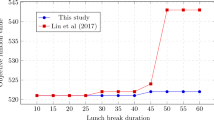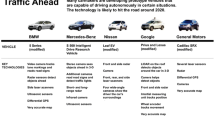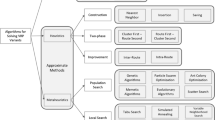Abstract
Recent research on the vehicle routing problem attempts to integrate so-called “green” aspects into classical planning models. The minimization of transport-related emissions (especially CO2) instead of driving distances is an important integration approach. Within this paper, we propose an approach which is focusing on the reduction of CO2 emissions caused by transportation. Based on the observation that vehicles with different maximal payload values have different payload-dependent fuel consumption characteristics, we integrate into Dantzig’s classical vehicle routing model the option of choosing vehicles of different size for route fulfillment. Then, the Emission Minimization Vehicle Routing Problem with Vehicle Categories (EVRP-VC) is introduced. It aims at minimizing the fuel consumption, respectively CO2 emissions instead of the driving distances. Comprehensive computational experiments with CPLEX are conducted to evaluate the EVRP-VC. A major finding is that the quantity of fuel needed to serve a given request portfolio can be reduced tremendously by using an inhomogeneous fleet with vehicles of different size.






Similar content being viewed by others

Notes
Instances are available via http://www.logistik.uni-bremen.de/evrp.
References
Bektas T, Laporte G (2011) The pollution routing problem. Transp Res Part B 45:1232–1250
Dantzig G, Ramsey R (1959) The truck dispatching problem. Manag Sci 6:80–91
Demir E, Bektas T, Laporte G (2011) A comparative analysis of several vehicle emission models for road freight transportation. Transp Res Part D 16(5):347–357
Eguia I, Racero J, Molina JC, Guerrero F (2013) Environmental Issues in vehicle routing problems. In: Erechtchoukova MG et al (eds) Sustainability appraisal: quantitative methods and mathematical techniques for environmental performance evaluation. Springer, Berlin, pp 215–241
EU (2012) Eu transport in figures. Statistical Pocketbook 2012. Publication Office of the European Union, 2012. doi:10.2832/52252, Luxembourg
Eurotransport (2013) http://www.eurotransport.de/test/. Date of access: 2013.03.10
Figliozzi M (2010) Vehicle routing problem for emissions minimization. Transp Res Record 2197:1–7
Frey C, Zhang K, Rouphail N (2010) Vehicle-specific emissions modeling based upon road measurements. Environ Sci Technol 44(9):3594–3600
Gusikhin O, MacNeille P, Cohn A (2010) Vehicle routing to minimize mixed-fleet fuel consumption and environmental impact. In: Proceedings of 7th international conference on informatics in control, automation and robotics, pp 285–291
ICF (2006) Assessment of the greenhouse gas analysis techniques for transportation projects. 6 NCHRP Project 25–25 Task 17, ICF Consulting Fairfax, VA
Jabali O, Van Woensel T, de Kok A (2012) Analysis of travel times and co2 emissions in time-dependent vehicle routing. Prod Oper Manag 21(6):1060–1074
Jaramillo J (2010) The green single vehicle routing problem. SE INFORMS annual meeting, Myrtle Beach, SC
Kara I, Kara B, Yetis M (2007) Energy minimizing vehicle routing problem. In: Dress A, Xu Y, Zhu B (eds) Combinatorial optimization and applications. Springer, Berlin, pp 62–71
Kopfer HW, Kopfer H (2013) Emissions minimization vehicle routing problem in dependence of different vehicle classes. In: Kreowski H-J, Scholz-Reiter B, Thoben K-D (eds) Dynamics in logistics, lecture notes in logistics. Springer, Berlin, pp 48–58
Kuo Y (2010) Using simulated annealing to minimize fuel consumption for the time-dependent vehicle routing problem. Comput Ind Eng 59:157–165
Kuo Y, Wang CC (2011) Optimizing the vrp by minimizing fuel consumption. Manag Environ Qual Int J 22(4):440–450
Meyer H, Fehrentz P (2011) Weiterentwicklung der Berechnungen zum Energieverbrauch und zu den CO2-Emissionen im Rahmen des NAMEA-Rechenansatzes. Statistisches Bundesamt, Wiesbaden
Ntziachristos L, Samaras Z (2000) Copert III computer programme to calculate emission from road transport: methodology and emission factors (version 2.1). Technical report No 49. European Environment Agency, Copenhagen, Denmark
Oberscheider M, Zazgornik J, Henriksen CB, Gronalt M, Hirsch P (2013) Minimizing driving times and greenhouse gas emissions in timber transport with a near-exact solution approach. Scand J For Res. doi:10.1080/02827581.2012.758309
Peng Y, Wang X (2009) Research on a vehicle routing schedule to reduce fuel consumption. In: Proceedings of 2009 international conference on measuring technology and mechatronics automation, IEEE, pp 825–827
Sbihi A, Eglese R (2010) Combinatorial optimization and green logistics. Ann Oper Res 175(1):159–175
Scott C, Urquhart N, Hart E (2010) Influence of topology and payload on CO2 optimized vehicle routing. In: Chio C (ed) Applications of evolutionary computation. Springer, Berlin, pp 141–150
Spritmonitor (2013) http://www.spritmonitor.de. Date of access 2013.03.10
Suzuki Y (2011) A new truck-routing approach for reducing fuel consumption and pollutants emission. Transp Res Part D 16:73–77
Toth P, Vigo D (2002) The vehicle routing problem. SIAM, Philadelphia
Ubeda S, Arcelus F, Faulin J (2010) Green logistics at Eroski. Int J Prod Econ 131(1):1–8
UK Department for Transport (2007) Effects of payload on the fuel consumption of trucks. UK, DfT, London
US Department of Energy (2008) Fuel economy guide. http://www.fueleconomy.gov
Author information
Authors and Affiliations
Corresponding author
Rights and permissions
About this article
Cite this article
Kopfer, H.W., Schönberger, J. & Kopfer, H. Reducing greenhouse gas emissions of a heterogeneous vehicle fleet. Flex Serv Manuf J 26, 221–248 (2014). https://doi.org/10.1007/s10696-013-9180-9
Published:
Issue Date:
DOI: https://doi.org/10.1007/s10696-013-9180-9



